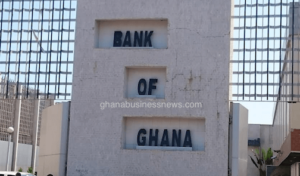Bank of Ghana spends GH¢358m on banking supervision in 2022
A 409% jump from 2021
 The Bank of Ghana spent GH¢357,923,000 on banking supervision in 2022, GH¢280 million more than it spent in 2021, a 409 per cent jump. The Bank in its 2022 Annual Report released last week indicated under notes to the consolidated and separate financial statements for the year ended 31 December 2022 that in 2021, it spent GH¢77,489,000 on banking supervision.
The Bank of Ghana spent GH¢357,923,000 on banking supervision in 2022, GH¢280 million more than it spent in 2021, a 409 per cent jump. The Bank in its 2022 Annual Report released last week indicated under notes to the consolidated and separate financial statements for the year ended 31 December 2022 that in 2021, it spent GH¢77,489,000 on banking supervision.
It explained that, included in the Banking and Supervision expenses of GH¢358 million is an amount of GH¢341 million that relates to Resolution expenses (2021: GH¢67 million).
The central bank regulates and supervises commercial banks and other financial institutions. The Banking Supervision Department which is directly under the office of the Second Deputy Governor is responsible for the regulation and supervision of banks, development finance institutions, savings and loans companies, finance houses, finance and leasing companies, leasing companies, mortgage companies and Representative Offices of foreign banks among others.
The Bank’s gloomy 2022 report states in the Governor’s foreword that it made significant losses largely as a result of the Domestic Debt Exchange Programme (DDEP). Under the DDEP, a debt restructuring programme initiated by the government in response to the economic crisis created by the country’s high public debt which led to the country being locked out of the international financial market, the government is replacing old high-yielding bonds with lower-yielding ones of longer maturities.
“The central bank’s holdings of government debt were restructured. Non-marketable holdings of government of Ghana instruments including long-term stocks, a COVID-19 Bond and overdraft were subjected to a 50 per cent haircut. Bank of Ghana’s other claims (holdings of marketable instruments) were exchanged under similar terms as other financial institutions under the DDEP. This led to an impairment of GH¢48.40 billion in 2022. At the same time, the Bank incurred revaluation losses on its foreign assets and liabilities due to exchange rate depreciation. The impairments and revaluation losses led to a negative equity position of GH¢55.12 billion for 2022,” the Governor wrote.
The loses and expenditure on banking supervision come against the backdrop of economic growth slow down on the domestic front.
The Report notes that the economy slowed to 3.1 per cent in 2022, from 5.1 per cent in 2021, on the back of weakened aggregate demand and supply shocks arising from the lingering effects of the pandemic and geopolitical tensions.
The Governor notes further that sovereign credit downgrades by rating agencies over fiscal policy implementation and debt sustainability concerns led to loss of access to the international capital market which, together with low domestic revenue mobilisation, negatively impacted government’s ability to finance the budget.
“This prompted the Bank of Ghana to intervene to close the widened financing gap to avert domestic debt default and a full-blown economic crisis. Despite a healthy trade surplus, the balance of payments recorded a deficit of $3.64 billion on account of significant net outflows in the capital and financial account. This led to a drawdown of $3.46 billion in Gross International Reserves from $9.70 billion at end-December 2021, to $6.24 billion at end-December 2022, providing 2.7 months of import cover,” he wrote.
He added that the significant drawdown in reserves triggered immense currency pressures and the global economy was confronted with significant challenges due to the Russia-Ukraine war, persistent and broadening inflation pressures, volatile commodity prices, economic slowdown in China, series of negative supply shocks, and tight financial conditions.
“At the beginning of the year, expectations were that the COVID-19 pandemic-induced pent-up demand would be released to boost growth, but the onset of the Russia-Ukraine war introduced new uncertainties, aggravating the existing pandemic-related supply bottlenecks, and challenging the reduction in the Common Equity Tier 1 capital ratio to 5.5 per cent, from 6.5 per cent, and an increase in the maximum Tier 2 capital ratio to 3.0 per cent, from 2.0 per cent of total risk-weighted assets,” he said in the foreword.
By Emmanuel K Dogbevi
Copyright ©2023 by NewsBridge Africa
All rights reserved. This article or any portion thereof may not be reproduced or used in any manner whatsoever without the express written permission of the publisher except for the use of brief quotations in reviews.
